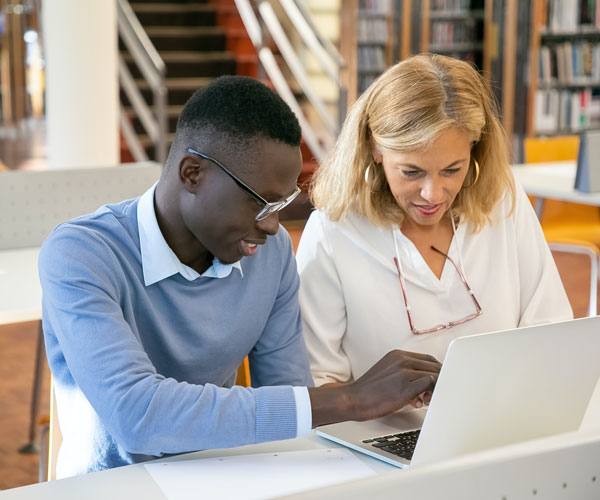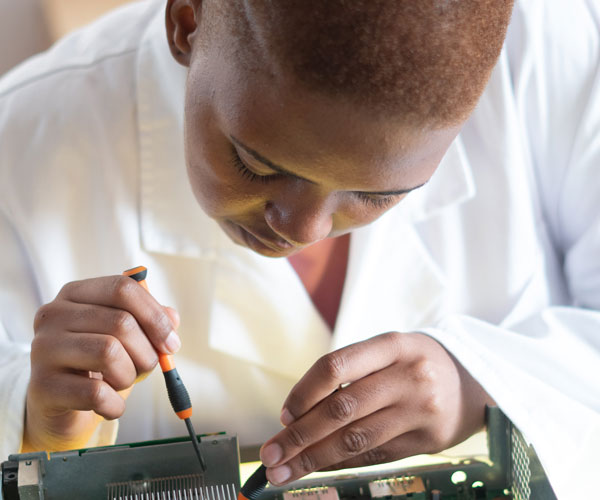
Science in Africa needs urgent support as many African countries are experiencing a massive ‘brain drain’ of talented scientists seeking jobs abroad, while many of the scientists who stay struggle to build a career.
To facilitate the return of young scientists to Africa and help local researchers to establish their own labs, TWAS and the BMBF have joined forces for a novel capacity-building programme called “Seed Grants for New African Principal Investigators” (SG-NAPI). Both parties have already endorsed an agreement defining this new seven-year initiative and plan to launch the programme in early 2021.
In addition to providing research support, SG-NAPI aims to create the conditions to foster interdisciplinary collaboration between African laboratories and industrial partners and to transform basic science into applied research. The African S&T sector suffers from a chronic lack of investment, which does not exceed 0.5% of GDP in many sub-Saharan countries.
“This project brings together two partners with a wealth of experience and great commitment to fostering scientific development in the Global South. Both TWAS and the BMBF share the belief that through education, high-quality training and transnational collaboration many African countries will be able to tackle their regional challenges as well as contribute to addressing the global ones," said TWAS Executive Director Romain Murenzi.
A key feature of the programme is its modular structure which offers a range of flexible options. Scientists can apply for research training grants, for exchange and research visits grants or for conference and industrial grants that offer them the chance to learn new skills and establish links to the private sector. Grants will also be available to cover equipment and consumables, as flexibility and modularity are key qualities of the programme.
Two central pillars of the programme are the grants devised to promote the establishment of intra-African collaboration and cooperation with Germany.
As TWAS Programme Coordinator Max Paoli explained: “Intra-African cooperations are important because of their potential to establish and reinforce ties with experienced African scholars, especially in LDCs. These early networks will become an asset in the future, once the grantees have gained the experience to lead their own groups. The South-North opportunity to visit laboratories in Germany stands out as a chance for both training to develop skills and long-lasting collaborations."
South-North exchanges are likewise a relevant feature of the programme – by visiting a German partner, African group leaders can broaden their horizons and establish a mentorship before bringing new skills and contacts back home with them.
The programme will allow young researchers from a broad spectrum of scientific fields to participate in high-quality training. At the same time, it aims to ensure both the gender balance and equity.
Another striking feature that makes this programme stand out from others is the innovative “Scientist after child” scheme. Pregnant scientists and new mothers will be entitled to apply for extra funding to hire a lab assistant to help provide qualified support during their maternity leave. This financial support will allow the scientist to keep up with lab work without forsaking their childcare obligations during parental leave.
This innovative scheme recently received praise from UNESCO Director-General Audrey Azouley. It also serves to fulfil Sustainable Development Goals 5 and 10 – gender equality and reduced inequalities. Overcoming gender inequalities is also included as one of the commitments of the BMBF’s Africa Strategy.
SG-NAPI will comprise three stages over the course of seven years: a three-year awarding stage followed by a two-year project completion stage and then a two-year evaluation phase.
During the awarding phase, 20 scientists per year – 60 in total – will be admitted into the programme, which is worth a total of $6million (US dollars). As far as possible, the funding will be equally distributed across four sub-regions – western, eastern, central and southern Africa – with special consideration given to candidates from LDCs.
Efforts to build the African science system through SG-NAPI are in line with the Africa Strategy of the BMBF. Both TWAS and the BMBF have a strong history of supporting science in Africa through fellowships and grants.
In cooperation with national science agencies in leading developing countries, TWAS manages the world’s largest South-South PhD and postdoctoral research fellowship programme with almost 400 fellowships available each year. In addition to this, the Academy awarded more than 2,500 grants between 1986 and 2018. Most of these were awarded through a long-standing partnership with the Swedish International Development Cooperation Agency (SIDA) that dates back to 1991.
Within the framework of its Africa Strategy, the BMBF funds a broad range of projects and initiatives in areas that are particularly relevant for the African continent such as climate, health, bio-economy, the environment and renewable energy.
Thanks to the anticipated outcomes of SG-NAPI – containing brain drain, helping scientists to establish careers in Africa, raising scientific standards across Africa and LDCs, introducing new S&T competences at the university level and promoting cooperation among universities and between basic and applied research through industrial partnerships – TWAS and the BMBF are thus moving another step closer to achieving the goals that will enable Africa and its people to keep pace with a fast-moving world.
The call for funding applications will be prepared in early 2021 and will be announced through the social media and communication channels of TWAS and the BMBF.
Cristina Serra

